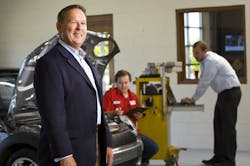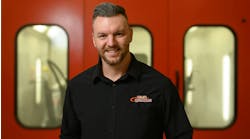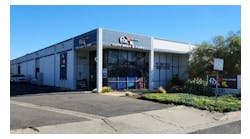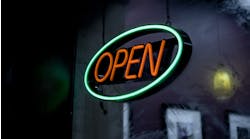On Jan. 5, 1Collision Network announced its entrance into Minnesota with the addition of five locations in the Minneapolis-St. Paul marketplace. With the new locations, 1Collision now operates in seven states and represents three of four regions in the U.S. (West, South, and Midwest).
Jim Keller, president of 1Collision Network, started the network based on a need he saw for an organization that could provide additional help to independent shops that were having a difficult time competing.
Keller took inspiration from his background in the industry. He began his career sweeping floors at a collision repair shop, later managed a dealership collision center, and ran his own shops. He earned a business degree at Cardinal Stritch University, and served as the chairman of the Automotive Service Association (ASA). He put all of that experience into founding the 1Collision Network, and works to provide shop owners with the support that they need to succeed. And Keller has grown the network through a precise expansion model that he details here.
How does 1Collision evaluate a specific marketplace?
Since our start in the Midwest, our strategy has been to identify both primary and secondary U.S. markets where the collision repair space is competitive. We also are looking to identify single-location independent or dealer repair businesses that are interested in continuing to successfully grow their business and earn more profit through the support we provide.
Our network entrance and growth in various markets has come in different ways. Some of those that have affiliated with us were single- or multiple-location independents or dealers who we’ve met through industry organizations and by attending NACE, SEMA, CIC, conferences, and association meetings. Some shops we have met were introduced to us through our strategic partners and insurer recommendations, and some have reached out to us after reading articles about our network in the trade press, and through existing locations referring their friends. The Network brings value to shops in any market. It is really dependent on identifying the candidates to build a group in the market. The process starts when we identify shops that want to compete at a higher level, and determine through assessment if they are a fit for our model. States such as California, Minnesota, Illinois, Florida, and Texas have high vehicle registration counts and significant consolidation activity, which make them prime areas for us to enter, as are local markets like Dallas, Nashville, Atlanta, Denver and Phoenix. In most cases, we like to design the strategy for each market by leveraging strength in numbers, and the power of multiple well-performing locations. However, a single store in a smaller market can also gain a great deal of support with our program as well. Our entrance in each new state or local area will be based on identifying, qualifying, building relationships with, and signing shops that are leaders in their market.
Once a shop joins, what are the next steps?
The first thing is that it has to be a mutual decision. The shop has to want to work with us, but we also have to want to work with the shop. Once we’ve decided that we want to work together, we do a complete assessment of the company—that includes everything from business planning to performance and marketing. We find out what their goals and objectives are and then we write an in-depth business plan. It outlines the steps that they will need to take in order to meet their business objectives. The business plan outlines what 1Collision can provide support with and what shop owners can do by themselves. For example, Shop A might need a lot of help with marketing, and Shop B might be the exact opposite and need help with the performance side. Then, when those needs are met the focus might switch. If there’s a need that a shop has that we don’t directly have the resources for, we can reach out to one of our many partners.
1Collision recently entered the Minnesota marketplace and became the seventh state in which 1Collision Network operates. What is the significance of that?
First of all, all five of the shops that joined in Minnesota are all run by great operators. It’s a great group of shops that does a significant volume of business. When a shop joins our network, it’s usually someone that has more than one location. In this case, all five of the locations are individually owned. Another unique aspect to this announcement is the Minnesota marketplace itself. Minnesota is the home of ABRA and has significant market coverage, but other than other independently owned MSOs, there aren’t a whole lof of franchises or networks in Minnesota. Minnesota has 5 million registered vehicles in the state. Compare that to the state of Illinois. Illinois has 5.7 million registered vehicle owners, but Illinois has Chicago. Chicago is the second largest network for collision repair in the United States and has CARSTAR, Fix Auto, Gerber, Service King and ABRA. These two states have very similar car counts, but Minnesota is unique in terms of its lack of organized franchises. Most big metros have multiple operators of the Big 4 and most of the major markets have a couple of different franchises and or network operators. There are a lot of great independent shops in the Twin Cities. If you look at a map that shows where all of our locations are, five of the states that we’re located in are in the Midwest (Illinois, Indiana, Iowa, Minnesota, Wisconsin), the Midwest is our root, so expanding in Minnesota is a way to establish our network.
You mentioned that the Minnesota marketplace is unique. What are the unique aspects of Minnesota and other marketplaces that 1Collision takes into consideration?
The competitive environment of the market is one of the most powerful dynames. For example, Minneapolis/St. Paul have many really good shops, a number of quality MSOs, a few locations of a paint franchise, but only one of the Big Four consolidators. California is unique in that they have two of the Big Four consolidators, a number of quality MSOs, and all three collision franchise groups—including 1Collision Network.
We have found that while some areas of the country are similar in nature to others, some markets also have dynamics that make that market unique. Examples such as a high concentration of quality dealer operated shops, where because they sell the car to consumer the dealer has a more captive customer by nature. In other markets, where I-CAR and trade associations have a strong presence, the shops tend to be more educated and operate at a higher level of performance. We have also found markets where only a handful of shops are working in partnership with insurers, allowing those that do to thrive. And of course, in a market where MSOs have a strong market share, the bar is raised to win the insurer and consumer business. Many shops are contacting us to find out how they can have the competitive solutions as part of a group. Marketing strengths, SOPs and operational support, strong strategic purchasing agreements, talent acquisition, and others can be differentiators. As the collision industry becomes more corporate, having access to a corporate level of support for many independents is becoming more critical.
Is there a difference in how you go about signing shops in different marketplaces, such as California and Minnesota?
California, Michigan, Louisiana, and Minnesota are new markets for us. In all four cases, the shops that signed with us were willing to be leaders and be the first in their state to sign and help the Network grow. Our entrance into each new state will be based on building a strong relationship with and signing shops that are leaders in their market, which aids in stimulating growth in that market. The process for signing a shop is unique with each owner—it’s really all about the relationship we build with the owner and/or management team. We have signed a shop on board in as little as three meetings within a month, or it can take six meetings or more per year to sign them. Shops affiliate with networks for various reasons. Sometimes, events like a large MSO knocking on the door or entering the market, or other larger single location competitors growing their market share can generate a fear factor. Since we operate in an occurrence driven industry, revenue increases come primarily by winning market share from the other shops. A shop must increase their visibility in order to grow. To increase visibility and grow, a shop must improve performance and marketing, better connect with their community, build better insurer relationships, have opportunities to procure parts and materials more cost-effectively, have a source for training solutions, and be able to acquire the talent needed to support that growth. Planning, implementing, and managing these areas necessary for the growth of a collision repair business require expertise and skill. In many cases, it also requires utilizing outside professional support.
What can we expect from 1Collision moving forward?
Our expectations are to grow on a regular basis. We’re looking at markets that make sense for us to have an affiliation with. We’re also looking at areas that insurers might like to see developed. We have a few shops in rural areas that might be two hours from the nearest adjuster or appraiser. If we can find shops that insurers feel comfortable working with in these rural areas, that saves a lot of travel time. We’re looking at different areas, like California for instance. Los Angeles is the largest market for car crashes. That’s a move that makes sense for us. We’re also looking at San Diego, San Francisco and Phoenix. We also are looking forward to building our presence in Louisiana—growing in the South from Texas down to Florida. Between our locations in California and Minnesota, there’s Nebraska and Colorado. We’re not jumping all over the place. We’re making moves in marketplaces that it makes sense for us to go. We want to grow steadily and deliberately. Ohio and Indiana fit into our geographical region, as do Missouri, Tennessee, and Oklahoma. Those are just natural areas for us to get into. We’re also looking at Georgia, Florida, and Texas because there are a lot of registered vehicles there. There’s a lot of consolidation. With that many vehicles, there’s going to be a need for body shops.
What are 1Collision’s goals for the future?
I’m not sure if it’s about the number of states we’re in as much as it is about growing and building our group of shops in a way that makes sense. Our target is to be at 150 locations within 4 years. Right now, we’re 20 percent there. We’re all about building groups. If you divide the country into four regions, we already have a presence in three of them. The East, an area that we’re currently not in, is something that makes sense for us as well. We’re going to continue to work with shops and make sure that it's the right fit for both of us.



